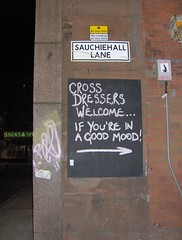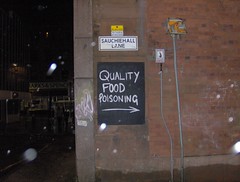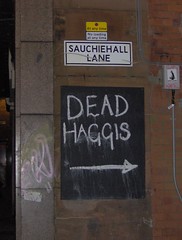Sunday, April 29, 2007
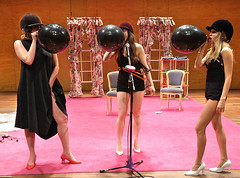
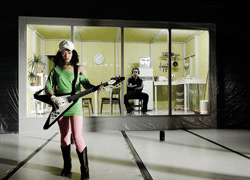


Title:Amada
Artist: Arches Award For Stage Directors - Cora Bissett
Venue:The Arches, Glasgow, Friday 13th April 2007
Maria was a fierce old prostitute, she died independent and world famous, she loved all her clients for the length of the session and people came from all over to see her. But who was Maria - daughter of a bankrupt family, they leave Spain behind them, arriving in South America as a teen. An excitable young girl, she rushes towards the train tracks to wave at passengers, but something happens, and she ends up brain damaged.
From there Amada is a tale of tragedy. Failed marriages, children, ending up abandoned and alone, a whore holding on to hope. A play based on an 8 page short story by Chilean writer Isabel Allende. The play is performed by 3 actors, a singer and a guitarist, all but Maria shifting roles as they shift the basic scenery about, adapting to each new scene. Despite periodic snatches of Spanish, and the use of Spanish accents, there are still scenes where they manage to put on a pronounced Scottish accent - something common in performances here, even if there is no apparent reason for it. The play is bleak in topic, though handled with a certain absurdity and humour, that while not quite hitting the magic realism target it claims, still makes the result lighter than one might expect.
Title:Spanglebaby
Artist: Poorboy
Venue:The Arches, Glasgow, Saturday 14th April 2007
From the restriction of a single performance space with Amada, my second event at the Arches Theatre Festival makes use of the venue's unique properties. From the foyer we are escorted into the first tunnel, a closed off space where we are confronted by a girl on a space hopper, bouncing around our feet, forcing her away through the audience as they collect in the area. A man storms in to the area, wearing a track suit, carrying a football - he points at random members of the audience tells them they are in the team, and that they had better play better than last week. The girl stops in front of me, demands that i button up the backwards blouse that she is wearing, my fingers fumble with buttons till she gets bored, wanders off to paint her name across the wall.
From there we are led into the next arch, down one end behind a misty curtain two musicians play, at the other end a stage, along the walls cardboard cut up frames of dresses, watches, and other products. Here we are faced with Richard White, the footballer turned business manager. Richard is behind the development of a new online community - Better Life - where all sorts of virtual products, property and are available to the avatars of users. Though the real money is more likely to come from the "red zones", where "anything goes".
Through this, the little girl on the space hopper is now an 18-year-old art student, Amy Rose. Rejected by art school on first application, she despairs, she has to get closer to her subjects apparently, have a more mature approach. She needs to get a job until she can apply again, so she ends up as a temp PA at Better Life. Initially won over by the wonder of the vision Richard presents, and then latterly at the fore-front of his break down as things get messy.
As Spanglebaby goes on, we are led up and down the length of the arch, from set piece to set piece, switching back and forth between the two characters. As things get messy in Richard's life and he takes it out on Amy, we are led to seats and cushions, to watch how the finale plays out. Ranging from the far end of the tunnel to right in front of us, making full use of the space they have available.
Title:Mother, Father, Son
Artist: Arches Award For Stage Director - Rosie Kellagher
Venue:The Arches, Glasgow, Saturday 14th April 2007
A family drama. A domestic stage. Mother and Father potter around the house. A retired old couple. Son never leaves his room. They leave food for him at his door, in the morning an empty plate sits. They take turns sitting and talking to a lonely wooden door. Their only answer the occasional single knock for yes, a double knock for no. One morning they find a note - stop calling me son! When they question him on it he knocks three times!
What is going on? The doctors said there would be changes, but really Mother and Father haven’t seen Son in years. How do they even know that the person in the room is even Son? So they ask, a strange noise follows, the door opens a crack, and a finger is thrown out!
Mother, Father, Son is a sinister black comedy. Presented in the Arches's rehearsal studio, down below the regular archway tunnels, as part of the Arches Theatre Festival. A 3 person performance all on a single set stage - a kitchen and a door. Delivered in utter dead pan, regardless of utterly absurd events become.
Title:Oedipus Love You
Artist: Pan Pan
Venue:The Arches, Glasgow, Tuesday 17th April 2007
Oedipus has left home because of a curse that he will kill his father and marry his mother. He has shacked up with Queen Jocasta, who is indifferent about rumours about plague, but things that Oedipus is perhaps a little over-familiar with his daughter Antigone. Still Oedipus is concerned about the plague, and he has sent is brother Creon to Delphi to consult the Oracle. Though Jocasta reckons that Creon will just use the bus fare to get drunk. Meanwhile Antigone has been bullied by blind Uncle Tiresias into letting him join the band that she has with Creon. As tensions grow, Jocasta makes a dire prophecy - after all, how can Oedipus survive as King, when he can't even cook a fucking barbecue?
Irish theatre company PanPan present an updating of the Oedipus story. Greek tragedy performed with mad staring gravitas, a naked man balding man in high heels as the sphinx greets the audience. Tragedy as Irish soap opera, a family in therapy, refusing to face up to the secrets at the centre of their lives. Rock opera absurdity, as each member of the family grabs an instrument and cranks it out loud. Multi media production, the man in the sound booth scribbles the song lyrics on a bit of paper, camera focused on his actions showing on a screen, replaced by card board cut outs of the cast, other screens showing the bedroom from above as various characters retreat there.
The results of Oedipus Loves You is a wilfully dramatic piece that turns from tragedy to comedy in an unpredictable manner.
Title:Solo
Artist: Ann Liv Young
Venue:The Arches, Glasgow, Tuesday 17th April 2007
Ann Liv Young is an established young American choreographer. Solo is inspired by an idea expressed by Camus, relating to memory and how things are associated with memory. The bulk of Solo is made up of music, presumably each piece evoking a memory. The stage is simple, a couple of instruments, an oversized doll in exercise gear, Ann Liv and another woman in Swimsuits wearing horse riding hats, a man in a suit and horse riding hat.
Regardless of what idea Solo might be based on, most people could probably be forgiven for letting that slip there mind. It isn't long before the two women are naked, Ann Liv being quite considerably more pregnant than she may have been in the publicity shots. The pair sing along to cover versions, do sexy dances, and play toy instruments. Which is all bizarre enough, and you can watch members of the audience either laughing nervously or looking at each with uncertainty. But with each piece Ann Liv gets increasingly annoyed, her fellow performers just can't get anything right. She shouts at them, each piece is stopped, re-started, cancelled all together by tantrums. One moment Ann Liv is going through a dance routine with chocolate sauce, the next she is smashing the doll to pieces with a microphone stand.
Solo is theatre of the crap, of the consciously rubbish. But it knows that, and it isn't pretending to be something else. With that it comes across as being silly, kind of fun - as Ann Liv realises they have over run their time, she suggests people are welcome to leave, though no one does.
Title:Apeneck Sweeney
Artist: Paul-Vincent McInnes
Venue:The Arches, Glasgow, Wednesday 18th April 2007
“A clutch of rarely rendered texts by T.S Elliot provide the jumping-off point for this surrealist nightmare concerning call-girls, cannibalism, pimps, Americans and life on a crocodile isle.”
Based on that description listed in the season brochure for the Arches Theatre season I thought that Tokyo-based director Paul-Vincent McInnes’s “Apeneck Sweeney” might be quite interested. The audience files into one of The Arches’ performance spaces, with two women already standing on the darkened stage. Before anything happens a voice over reads out a piece, presumably the most direct referent to Elliot’s material, dark and brooding words, dripping with potential.
The women are dressed up as geisha, the full kimono and make-up deal, holding brushes, so that once the words finish and traditional Japanese strings play, the pair sweep the floor, gathering cherry blossom that drops from the ceiling. Animated sequences loop across the back wall of the stage, repeating throughout the performance with periodic variations, a cool style of cool people in cool situations.
Once the pair have done they strip out of the kimono, to reveal lingerie like evening dresses, in which they lounge around their flat, drinking wine, doing the tarot and waiting for clients to call. The pair chatter away, until one casts the card for the coffin, and that changes the mood. Shortly after that Sam arrives, with him he has an American couple, interested in being shown a good time by these two professionals.
They go out on the town, Sam performs some Karaoke for the audience, includes us all with a raffle draw - a bottle of whisky from the season sponsors being given away, followed by tickets for Solo. In the midst of this we have the arrival of Mr. Sweeney, a regular customer, who draws out the girl that drew the coffin card. There is something sinister about Sweeney, something threatening, and he invites her to his cannibal paradise, his crocodile isle, all through song, jaunty and pseudo-witty little pieces. And just as you think, “ok, this is getting started now”, it finishes, and its all done, and its over, and I sat with a feeling of anti-climax, of how there had been all these little gimmicky things, and while the mood of the piece was in the cracks in between, the whole just did nothing for me in the slightest.
Title:The Endurance
Artist: Al Seed & Ben Faulks
Venue:The Arches, Glasgow, Friday 20th April 2007
“Men wanted for hazardous journey.
Small wages. Bitter cold.
Long months of complete darkness.
Constant danger.
Safe return doubtful.
Honour and recognition in case of success…”
-Advertisement placed by Sir Ernest Shackleton in The Time, December 1901.
Two men crawl across the cruel landscape. The wind howls, chasing them, biting at their heals. Bent double they drag their burden behind them. Heads shrouded in thick head gear, eyes covered in goggles, ragged beards crusted white. Every step is an act of exertion, every inch an act of endurance. For these are explorers. Actors. They put themselves through this in search of the fabled stage, where brother would kill brother just for the worst seat’s in the house. Behind them they pull a piano, hanging from it their costumes and the latest technology for travel - tinned food and a compass.
The Endurance is a surreal comedy drama, with Al Seed and Ben Faulks taking on the role of the two explorers. The stage is set, an archway beneath Glasgow’s central station, trains rumble over head every now and then, while ironically across the space tracks have been laid out, a piano balanced along the tracks, the pair dragging it with ropes. After the initial minutes of exertion, of howling wind sounds, and flashing lights the pair stop for a break. Here the story unfolds, between songs about the wonders of tins, the asides to the audience that explain the journey, the wonders of the stage. Insert into this a tortoise hand puppet, who taunts them, goads them onwards, and then add something, something unknown which dogs their trail, a darkness, a stinking brimstone threat that suggests failure and doom.
The results are an odd tale of endurance, an inspired parody, a high comedy, and a thoroughly enjoyable piece.
Title:Faust 3.2360words
Artist: Akhe
Venue:The Arches, Glasgow, Friday 20th April 2007
There is loud dance music and three Russians are running around, dancing in a kind of gleeful aerobic fashion. The audience take their seats, the men doing circuits stop at the front, do their little dance and carry on. There is a large shrouded cube, a glass tank full of water that hangs from chains, and some kind of desk contraption. On our way in we have all been handed headphones and power packs, this evening’s performance of Faust is in Russian, by the St. Petersburg company Akhe, a translation being delivered to our ears as the piece develops.
Faust 3 is a multi media piece, and it’s a bit barking mad. The short bald man is Dr. Faust, he has a desk which he uses for drumming, for containing all his electronic black boxes and Theremin type stuff for providing the show’s soundtrack. He dictates to the audience, a monologue shouted out, the history of Faust, of how he learned, of how brilliant he was. Behind the curtain we have the lurking Mephistopheles, the master of puppets, and things that go bang, squelch and the like - he buys Faust’s soul in exchange for ever increasing knowledge. But the third man, the lurker, the man who pulls strings, he waits for Faust, for he is the devil and he will come to collect.
The results are manic, and at times a little confusing. We rely on the man breathing in our ears to tell us what is going, and initially it really isn’t clear what parts the actors seem to be taking, since only one of them seems to talking - so was he explaining what was going on or was he talking about himself? But it didn’t really matter, the point was the spectacle, the amount of layers and textures the little tricks brought to the entirety.
As the play ends, the streaming electronic sign at the back of the stage shifts, switching from digitized flames, to the scrolling words - Faust Bar Now Open. Having taken the applause, the cast transform the stage into a bar, producing bottles of vodka, wine, and the apples used as props and offering them up for sale to the audience, an odd little twist to the proceedings.
Saturday, April 28, 2007
remote cast:RC8042007
Click here to get your own player.
Artist:Track:Release
1. Autechre: Second Bad Vibel: Anvil Vapre
2. Beefcake: Untitled 14: Drei
3. Zan Lyons: Warring Factions: Desolate
4. Gridlock: Voiceless: Trace
5. Zipperspy: Click N Gabber: Glass Bomb Baby
6. Ryoji Ikeda: Counterpoint: 00C
7. I-Burn vs Sshe Retina Stimulants: Resile III: Subfriend Traffic Perfection
8. Chris Clark: Slow Spines: Empty The Bones Ov You
9. Matera: Darkside 11am: Same Here
10. Sonar vs Mulsimgauze: Arsenic Device: Sonar vs Muslimgauze
11. Sonic Dragolgo: Don't Stop The Music: Don't Stop The Music
Thursday, April 26, 2007
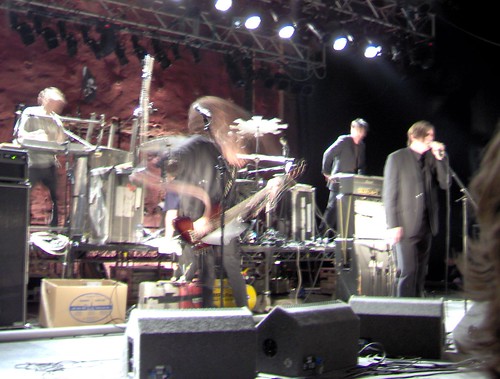
Headliner:Einstürzende Neubauten
Support: Damo Suzuki
Venue:Tramway, Glasgow, 25th April 2007
German industrialists Einstürzende Neubauten celebrate their 25th anniversary this year. In all those years they have never played Scotland till now. Playing a limited, mostly UK tour, in the midst of recording a new album, Einstürzende Neubauten come to Glasgow as part of the annual Triptych festival - even if by doing so they break the rules of the festival which encourages bands to play Glasgow, Edinburgh and Aberdeen over the course of a long weekend, we were glad to have them.
The gig was held in the Tramway, Glasgow's old tram depot, out towards the south side of the city. Doors opened at 7.30, and by strange quirk I found myself being the first person to enter. We headed to the bar; hanging out there I caught up with old friends while local DJs JD Twitch performed a warm upset. Just before 9pm the support band went on - Damo Suzuki - the singer of kraut-rockers Can, with a full band. The gig was in Tramway One, the hall I most often find myself in for theatre of dance productions here, though those are normally fully seated - as was the last gig I was at here Touch's Biosphere, Fennesz and Hazard tour a number of years ago. The seating had been removed however, transforming the hall so that it felt like a pretty decent sized concert venue - though the upstairs balcony was still available to those that preferred that option. The hall was busy, but not so packed that I couldn't walk right down to the front and stand and watch Suzuki. His set was long and repetitive, lots of guitars, drums, saxophone and seemingly Suzuki repeating the same two lines of lyrics for the entire set. No doubt of some interest to kraut-rock-psych-fans, but not of a lot of interest to me.
Einstürzende Neubauten have been consistently active over the years, and while I am quite familiar with the first half dozen or so albums, I am only familiar with random albums from more recent times. As such the set didn't seem to feature any material that I was actually familiar with, though the six piece band seemed to be playing a lot of new material - either from the forthcoming album or from releases for the fan base "Supporters" organisation. Regardless of familiarity of particular material, when Einstürzende Neubauten came on stage with two percussionists drumming on sheet metal and Blixa Bargeld's definitive German vocals we knew what we could expect to some degree.
Through the set Bargeld switched from German to English and back again, so that at times we were particularly aware with an obsession with airports, airport security, baggage security, and lost baggage - there seemed to be at least three pieces dealing with this topic, a dryly amusing insight into modern culture, and drolely amusing. The band Blixa Bargeld singing, Alexander Hacke on bass, N.U. Unruh with his home made percussion accompanied by drummer Rudi Moser, guitarist Jochen Arbeit, and Australian keyboard player Ash Wednesday, played a range of styles and instruments. Ranging from melodic/soundtracky pieces, to the full on chugging bass and lashing metal sheet percussion. To a degree along with Bargeld's vocals, it is the percussion that make Neubauten, and while Bargeld kept up a charismatic line of patter with the audience, it was the various pieces that Unruh and Moser produced that were the most fun - great metal circles for cymbals, metal bars, bags stuffed with polystyrene, plastic containers, jugs, boxes swung from strings, and plastic pipes balanced on a stool which created the most wonderful sounds of the evening.
Einstürzende Neubauten went on stage about 10, and played till about 12, and I stood one or two people away from the stage the whole time and I thoroughly enjoyed myself.
Wednesday, April 25, 2007
Headliner:Yann Tiersen
Support: Plus Support
Venue: The Arches, Glasgow, 24th April 2007
Arriving at the bright shiny front of The Arches, where the ticket desk, bar and restaurant are, desk staff were showing early signs of frustration. Punters being redirected round to the other side, to the dark side of The Arches, passed the hostel for the homeless, and into the dank street where the clubbers line up on the weekend. The last time I walked passed this alley, two weeks ago; there was a van full of police and two dog patrol vehicles. Fortunately they were not present this time as we got our little group together and stood in line.
Doors were listed as opening at 7.30, it wasn't long after that when they did, and we were filtered across the various bar areas, across 4 arches, till we reached the point where the gig would be held. The same place where I had seen Tinariwen weeks ago, but had come in at the other side. We milled around, until support appeared sometime after 8 o'clock. A three piece band, a guy with a guitar sitting down, a dark haired girl singing and playing bells, and a blonde haired girl playing violin and toys. The band, which went unnamed, played a kind of winsome Indy pop, mixing French and English vocals. Their performance had the air of the unrehearsed, taking turns to look at each other to check what song any of them thought they were playing. At times the singer seemed to remember she was holding bells and would ring them, leaving us unclear as to whether that was part of the plan. The violinist would wander round the stage, sometimes away from microphones that she was playing instruments into, as though to check they were going to do what she expected them to. Every song they played seemed to have the duration of about 2 minutes each and they only seemed to play about 5 songs. So they were done in no time, leaving with such suddenness that the audience weren't even entirely aware that they were done until they climbed off the stage, a token cheer going up a little too late.
Nine came and went. Roadies pottered about the stage, reached a state of happiness and left. The crowd milled around. Time passed. The crowd got restless. People started shouting things; a slow clap went up to indicate discontent. A guy appeared on stage, tuning guitar, girl appeared twiddling keyboard, a cheer went up. They played with the lights, people muttered discontent. The people on stage left, more time passed. Yann Tiersen and his band finally took to the stage, Yann ignoring the air of growing hostility takes time to introduce his band - the applause is polite.
Tiersen will be most well known for his work on the Amelie soundtrack, perhaps even his soundtrack to Goodbye Lenin, which works as a nice companion piece. Other people seemed to recognise the moments of soft rock ballad, singing along. My sister and some friends were here, one of those friends had seen Tiersen in France, playing with a full orchestra and he was apparently wonderful. That same guy speaking to a French girl was warned, Yann is going to play a heavy set, a lot of people aren't going to like it. I hadn't heard that warning till the end of the night. It is safe to say, Yann Tiersen rocked! What a wanker!
It seemed clear from the momentary recognition for pieces that Tiersen was playing through his back catalogue. Singing in French and English depending on the piece, he sang over emotional and dated pieces that held little interest in their own right. As the night went on I ached to leave, at one point I had even turned round to say that I was going when his accordion came out and he played a piece from Amelie. But when he did a smug wave and left the stage in preparation for the encore I did leave.
Over all Tiersen played two tracks I knew, and while those had momentary flashes of what I was after, of why I was there, they didn't last. For the most part every track devolved into a rock marathon, thundering drums and lashing guitars. Every wanky like guitar trick that could make the music sound even wankier was used. Tiersen was clearly desperate to be a prog-rock-post-rock rival to Godspeed You Black Emperor, only wanky. The music was shrill, widdly, twiddly and wanky. The first piece from Amelie, for example, started with plinking xylophone, then became a fair rock version, then became a 20 minute monstrosity. Several times through the set Tiersen replaced his guitar for a violin, on which he would play a limited range of notes and play them as damn fast as he damn well damn could.
I have seen all kinds of bands, I listen to all kinds of music. I have seen pretty much everything Tiersen had to offer, and I have seen it done so much better. I hated this gig. Tonight I am going to see Einstürzende Neubauten, hopefully they will not disappoint.
Tuesday, April 17, 2007
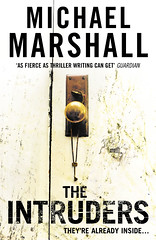
Title:The Intruders
Author: Michael Marshall
Publisher: Harper Collins
Jack Whalen is an ex-cop, moved from LA to a remote village in the Seattle area with his wife Amy. He published a book called "The Intruders", and is struggling with his follow up. A blast from the past comes in the form of someone from school, Gary Fisher, who was one of the cool kids, grown up to become a lawyer. Fisher is involved in the wrangling over a will, which seems to have become tied up in the murder of a family, and he wants Jack's input on the matter. Jack shows him the door, goes back to staring into space.
Jack gets a phone call; someone has found his wife's mobile phone. He arranges for it to be taken to the hotel she is staying in on business, and phones the hotel to let her know its coming. She isn't there. Nor is she in the hotel nearby with a similar kind of name. He drives into Seattle, picks up the phone, heads round to her office, but as far as they are concerned she isn't in Seattle. So where is she? He looks through the phone - strange pictures, strange messages, strange pieces of music - what is going on? Fisher comes back - "oh, did I mention, your wife is involved in this?"
At every stage, Jack is only interested in his wife, but he is drawn in anyway. A missing man who was investigating something to do with ultra-sound. Murder and conspiracy, references to reincarnation, ghosts, an organisation using the number 9 as a symbol. There is a man called Shepherd who seems to leave mayhem in his wake. And through it all a 9-year-old girl has gone missing, presumed abducted, but it’s much worse than that.
The Intruders is the fourth novel by Michael Marshall, following on from the trilogy The Straw Men, The Lonely Dead and Blood Of Angels. The Intruders is very much in the same kind of ball park - ex-cop, missing children, shadowy groups, the enforcers of the shadowy groups, the people who got to close to finding out about the groups, and the ghosts of the first Europeans to arrive in America. Once again, The Intruders has parallels with Brian Azzarello and Eduardo Risso's 100 Bullets. This time we may not have the Croatoa reference, but we have the Shepherd reference, the manager of sheep, the agent of the secret families.
Prior to these novels Michael wrote as Michael Marshall Smith, writing a kind of hybrid science fiction/horror. As Michael Marshall his novels have been more crime/conspiracy, with enough of a hint of the other to creep towards that hybrid territory again. With The Intruders he ups the element of other, so that there is a more pronounced element of horror weaving its way through the work. The ending has enough opening for there to be a sequel, but is done in such a way that it seems a little unlikely. Regardless, the next work to be published is the first novel by Michael Marshall Smith in 9-years, a limited edition titled The Servants.
Thursday, April 12, 2007
KURT VONNEGUT, 1922-2007
Heard it on the radio this morning.
Its been everywhere. All day long.
How many of us sit dazed today?
Monday, April 02, 2007
Sunday, April 01, 2007
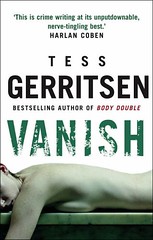
Title:Vanish
Author:Tess Gerritsen
Publisher:Bantam
When the Medical Examiner hears a noise in the mortuary she goes to investigate. There she is alarmed to find a woman in a body bag, waiting autopsy, who while not in great condition is in fact alive. The Jane Doe is taken to the hospital for emergency medical attention. When the mystery woman awakes she grabs a security guard’s gun and takes a handful of hostages. One of whom is a pregnant police officer about to give birth any minute.
Which covers the start of Tess Gerritsen’s Vanish as far as described by the book’s cover notes. With human trafficking, mystery gunmen, government conspiracy, and the obligatory terrorism references quickly cropping up, a novel that could have been a taut thriller set in a hospital, becomes something of an unwieldy slab, that doesn’t seem entirely sure of where it is going. Certainly Vanish is readable enough, a trashy novel where the pages just keep turning without the requirement for much thought. There isn’t anything especially memorable to the mish-mash of recycled generic ideas and there is an awareness throughout of the baggage that comes from characters firmly entrenched in an author’s series.
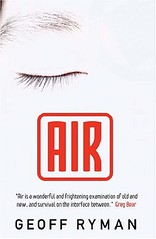
Title:Air
Author:Geoff Ryman
Publisher:Gollancz
Karzistan lies between Tibet, China, and Kazakhstan, and has had a mixed history influenced by the Chinese and Russians over the centuries. There a village high on a hill - 30 houses or so, a couple of 100 people, farmers and peasants - get a TV for the first time. But all around them the world prepares for the next step - from the internet to air - everything you can think of beamed straight into your head, and available with a simple thought. The villages isolation is about to end , whether it likes it or not. When Air is tested, the unprepared village is thrown into turmoil. Mae seems to be driven mad by the test and some of its more tragic results. But at the same time she seems to be the only one prepared to ensure that the village is ready for when Air goes live for real in a year’s time. Mae, farmer’s wife and the village fashion expert by virtue of knowing where to shop when she travels to the nearest town, can see her world come crumbling down, everyone will have knowledge and the reality of keeping the farm in business won’t just go away.
Air or Have Not Have is the second novel I have read by Geoff Ryman. Expanding on the short story Have Not Have, which I read a few years ago in Gardner Dozois’s annual collection of the Best SF short stories. Ryman takes an approach to science fiction which he calls “mundane”, the idea being that he only writes from an extension of what he considers real science. As such a lot of Air is about the culture clash of an isolated village brought kicking and screaming into the world, with that little nudge of technology that takes us from now into the future.
Some of the flashes into the past and future that Mae experiences are a little too reminiscent of The Child Garden, and some of the parts of Ryman’s writing that I am less keen on. Especially the way he handles those aspects of his work, though certainly within the context I suppose he has to do something to illustrate the scope of his work, to give it depth and history. I find some of his trigger points, the key points which move the story along, are a little grating for me. Forcing the novel to expand and become more than a short story in a manner that can feel brash. There can often be a strange sensation though, expanding from a short to a novel, which takes a little getting over with. But for any point where Ryman grates he also provides plenty of wonderful ideas. And I found myself drawn into Mae’s life, affected by the ups and downs, touched by the tragedies and fears as the future threatens to pummel the past. So that in the end I found Air thoroughly enjoyable.
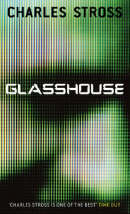
Title:Glasshouse
Author:Charles Stross
Publisher:Orbit
Robin is recovering from some major brain work. Much of his past is a mystery to him, though one thing seems certain, someone is trying to kill him. When he is approached to take part in a historical recreation it seems like the perfect next step. The professors will set up a remote and isolated community, with no interference from the outside and leave to the test group to live according to the rules of the time being studied. The professors are particularly targeting people with various levels of amnesia - obviously because they’ll have less bias or foreknowledge to taint the experiment. Obviously. Nothing to do with people with no memory being malleable and less suspicious about what is really going on. Once inside the Glasshouse, stripped of modern technology, restrained by a lord of the flies style peer pressure, it quickly becomes clear that things are going to get nasty. A sense that isn’t helped by the creeping return of Robin’s memories.
Glasshouse is an indirect sequel to Charles Stross’s Accelerando. Technological innovation has accelerated at such a rate that everything that was is changed. A period of incredible turmoil, clashing/competing formats, redundant data streams. Till a point where finally everything is streamlined, a common format is universally adhered to. Unfortunately when that format is targeted with a virus it spreads quickly, resulting in the Censorship War and the splintering once more into wary individual nations and whole chunks of history having been erased.
With these periods of the past having been lost the bright new future is left with no real idea of what happened in the time that led to the acceleration. It is now regarded as a dark age, a history black spot, and the experiment of the Glasshouse is notionally to work out how life really was in the period between 1950 and 2050. Stross layers questions here - most obviously Glasshouse presents us with a view of our own world shown through the eye’s of an outsider - a classic theme in SF. From that though we also have the idea of history and how things are perceived or distorted with time. Technology distorts perception, when we have a wonderful tool that does something, we don’t quite have the same grasp of how it was done before. So, how will people in 200 years time see the world we live in now? How will the traditions of now blur into the traditions of 10, 20 or 30 years ago? Perhaps as the people in Glasshouse see it - an absurd mash of time, strange rituals and logic - which if presented to us in this form would appear awkward and clumsy. In addition we have the question, what will we leave how will it outlast us - carvings in stone, paper, magnetic tape, disc, virus, erasure.
As a sequel Glasshouse has a difficulty. Accelerando was a dense collection of ideas, short stories written over years and streamed/evolved into a novel. Which gives it a greater depth and maturity in the end. Glasshouse was written as a novel, and feels somehow lighter for that. There are elements of the Accelerando world there, mixed with the Glasshouse, and the censorship wars, that link one to the other. Though the focus is in the environment of the Glasshouse. With that it isn’t really fair to compare a novel that spanned generations and massive changes, to a novel that is set in the aftermath. The flashback to the war feel out of place at times, splashes of a Richard Morgan novel invading the pages. But despite that Glasshouse is an engaging techno thriller, where the core story pulls us in and keeps us turning pages.
 this is the voice of re:mote induction.
this is the voice of re:mote induction.